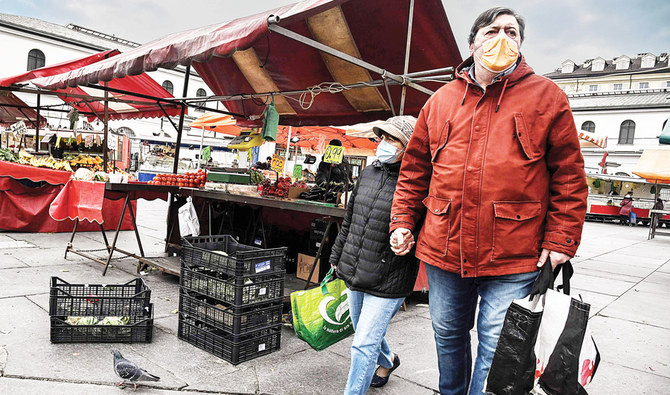DUBAI: One of Italy’s leading newspapers, Corriere della Sera, recently ran with the disturbing headline: “As in any war, we have to choose who to treat and who not.”
The story revealed an Italian health care system on the verge of collapse.
Meanwhile, on Sunday, agrigentooggi.it reported that two intensive care patients in their 60s had to be flown to Sicily due to a lack of hospital space in the Lombardy region, the worst-hit area of Italy for coronavirus cases.
Hard-pressed doctors in Italy are having to make challenging decisions on who to treat. The article in Corriere della Sera quoted an anesthesiologist at a hospital in Bergamo, an Italian city with one of the highest number of people with the COVID-19 disease, saying that the intensive care unit was at full capacity and medics were having to decide on who to treat first based on age, life expectancy and other factors.
“Italians complain that the government should have stepped in earlier, but I am quite sure that Italy has such a high number of cases in part due to the fact that they tested many people early on,” Cristiana Cassano, a nurse practitioner based in Milan, told Arab News.
“That’s why we have a good idea of the number of people who are positive but asymptomatic.”
The Italian lockdown, which was ordered on March 9 by Prime Minister Giuseppe Conte, imposed a national quarantine, restricting movement of the population except for the necessity of health circumstances and work.
Two days later, Conte announced further measures to contain the spread of the coronavirus, ordering all shops, restaurants and cafes to close. Food and drug stores as well as post offices and banks remain open. The new rules will stay in place until at least April 3.
Cassano can no longer take her newborn baby to her local park although her husband, who works for a major Italian bank, can still use the subway to get to work.
Rome-based economist, Dr. Giorgia Diletta Nigri, said: “Many Italians are on forced holidays. Some people are not getting paid. Some companies may not survive this crisis, and no one believes it will end on April 3.”
Jesse Smeal, an American who has lived in Rome for more than 20 years, has two restaurants in the city. “This has had grave consequences since I have had to close them. I have zero income at the moment,” he said.
The Italian slogan “andrà tutto bene” (meaning, everything will be fine) is appearing all over the country, and the hopeful spirit can be felt as people take to their balconies to sing together.
“Yesterday at noon everyone went out to applaud,” said Smeal. “This was in solidarity and to give thanks to the health care workers fighting each day.”
Each night in Rome music sessions have been taking place at 6pm. “Today we are supposed to go to the balcony at 9pm and shine a flashlight or phone light that will prompt a satellite photo to be taken to show the world that we are alive and well and will prosper,” added Smeal.
HIGHLIGHT
The Italian slogan ‘andrà tutto bene’ (meaning, everything will be fine) is appearing all over the country, and the hopeful spirit can be felt as people take to their balconies to sing together.
Margherita Emo, a Rome-based translator, said: “The other day we celebrated my friend’s birthday via Skype. There are many acts of solidarity. Many young people have offered to buy food for the elderly.
“When you go out you are supposed to stay 1 meter away from everyone and more and more people are wearing masks. We have been told to wash our hands for 40 seconds and memorize a poem or a song that lasts that long while we do so.”
She pointed out that while in lockdown at home it is hard for Italians to find out the full extent of the health crisis. “I heard there was a lack of blood in Rome the other day and many were asked to donate,” Emo added.
Italy has also witnessed several prison riots resulting in 12 deaths and 16 escapes, according to The Associated Press. In response, the Italian Justice Ministry said it had allocated 100,000 face masks to prison guards, staff and inmates.
“I hear ambulances all the time,” said one woman from Bergamo.
On Sunday, the governments of Spain and France introduced similar Italian-style lockdowns.
“We have realized that our well-being rests with the public health sector and its health workers who are all underpaid,” said a woman from San Terenzo, in Italy.
“They are now our heroes and I hope we all remember them in the future.”
















